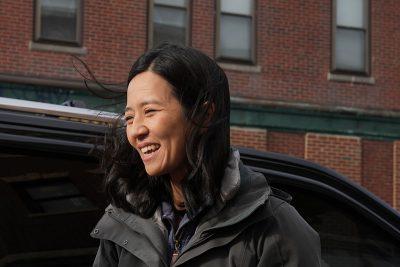
When Anna Litten’s ninth grade son needed a new Chromebook, he went to the library and checked one out for the day. Thanks to a new $12 million digital equity initiative, many other Boston Public Schools children are now also able to benefit from improved access to digital learning tools.
Mayor Michelle Wu and Senator Ed Markey signed the initiative Feb. 2, granting $2.2 million in Emergency Connectivity Funding to provide Chromebooks and Wi-Fi to 3,000 Boston Public Library patrons. The additional $10 million supports internet connectivity for 20,000 BPS families, according to a press release.
Boston’s efforts to improve digital equity began before Feb. 2, starting with computers and internet access for students and patrons of the library.
“Giving kids free and easy access to the internet is just vital for their education,” Litten, who is also the assistant director of libraries for the Arlington Libraries Foundation, said. “There’s no way kids can access their educational tools without internet access.”
Mike Lynch, the City’s director of broadband and cable, described the initiative as “a bold new advance.”
Although the initiative focuses on BPS students, the city of Boston plans to lend Wi-Fi devices and Chromebooks to veterans, seniors, new immigrants and more through the Boston Housing Authority.
“The internet is vital infrastructure that every resident needs to be able to access, especially now,” BHA Administrator Kate Bennett said in the press release. “We use it to pay bills. We use it to work. We increasingly use it to buy groceries and meet essential needs at home.”
Lynch said he recognized seniors as the demographic not “taking advantage” of the technological resources provided for them.
“The first challenge is getting them the piece of equipment — tablet, Chromebook, whatever to get online — and the connectivity to get online. The easiest way to do that is with a hotspot or a home router,” Lynch said. “So that’s where we’re starting.”
Lynch said Boston will continue investing in a nonprofit — Tech Goes Home — which uses volunteers to teach seniors how to work technology.
“Most of these people who do the training are volunteers,” he said. “They’re teachers, they’re compassionate individuals. They work with an agency and then they say ‘I’d like to help people get online.’”
Litten said she noticed a man entering the library asking for a computer to fill out a rental assistance application.
“Lives were really disrupted and he did not have internet access at home and the rental assistance program he was trying to access had an online portal,” Litten said. “If he was not able to access those tools, he would have not been able to fill out that rental assistance program.”
In addition to the provision of laptops and Wi-Fi devices, the federal government is also helping fund internet for families in need through the Affordable Connectivity Program — offering $30 worth of broadband services per month and a one-time discount of up to $100 toward a technology device.
“It’s kind of like a lifeline service set up by the federal government inside the Federal Communications Commission, which if you can figure out how to apply, you can get service for free,” Lynch said.
Lynch said he views the program as an “infusion of new money into the city from the federal government.”
“If you get a whole bunch of people to sign up for that, that’s new money that’s coming into our city economy being spent,” Lynch said. “That’s not a bad thing because it’s not coming out of poor families’ pocketbooks.”
Lynch added it is a “challenge” when each household needs to file an eight-page application form without getting help from the government, community and nonprofit organizations.
“The idea here is we’re going to hold their hand and help them sign up this program,” he said. “We already have over 17,000 Bostonians signed up. But I think we could double that cover.”
Aside from access to assistance programs, Litten said integrated technology is important in regular life.
“Finding ways to make sure we are providing real and helpful access to technology is crucial for communities,” Litten said.





















































































































